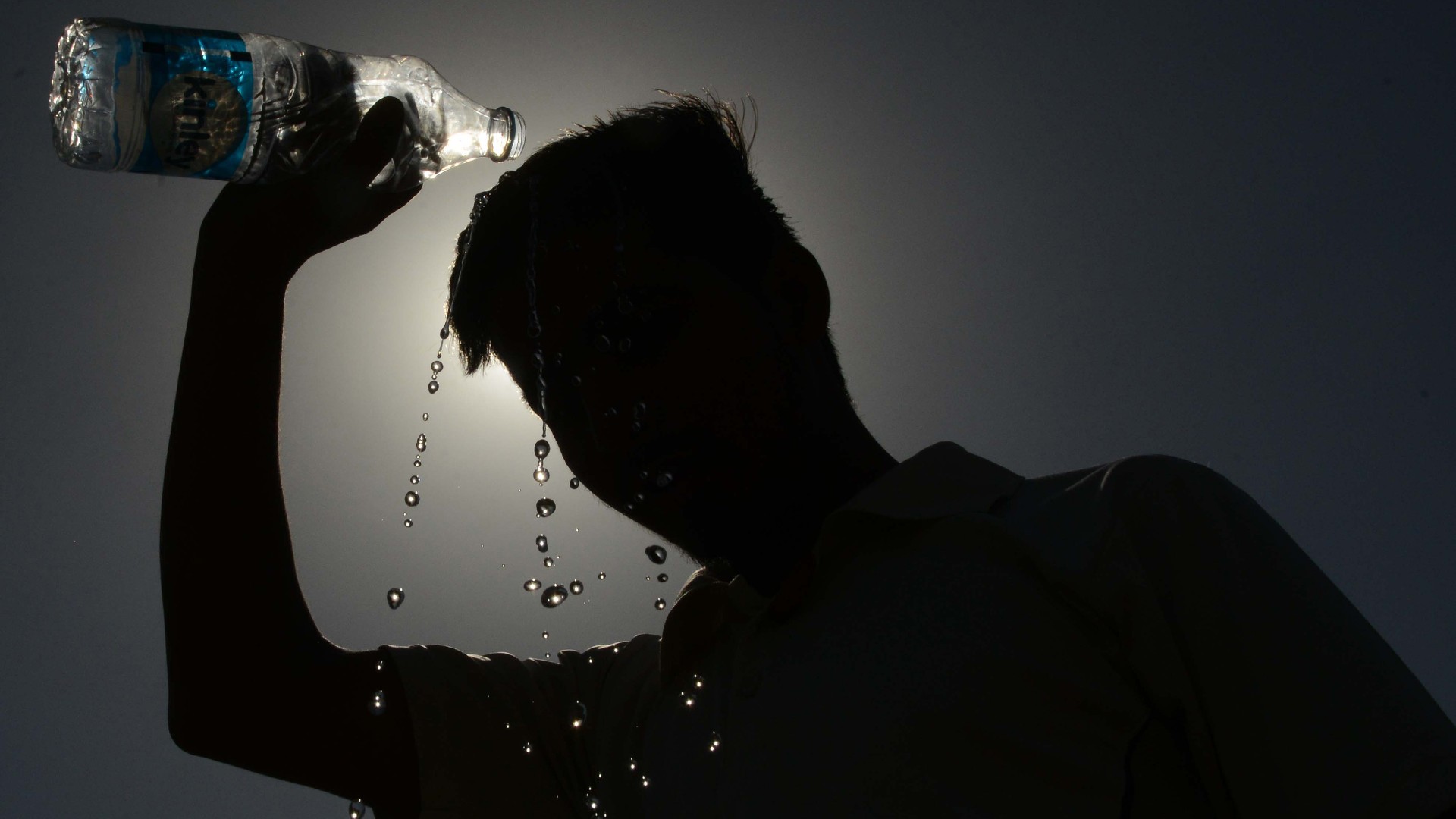Europe in emergency before the heat wave 0:57
(CNN) --
Carilion Franklin Memorial Hospital in Rocky Mount, Virginia, is packed -- seeing its share of Covid-19 cases and more common problems this time of year, like boating accidents.
But its professionals also treat sick patients for something deceptively dangerous: extreme heat.
High temperatures in the area are around 32 degrees Celsius this week, but when humidity is taken into account, the heat rises to 40 degrees Celsius.
Extreme heat will once again scorch much of the United States, including areas where thousands of people have lost power.
"We've had people come in here today after mowing the lawn," Dr. Stephanie Lareau, an emergency physician, said Tuesday.
"Fortunately, sports practices haven't started yet, so we haven't gotten much of a young population. We see a lot of cases related to extreme heat when football practices start," she added.
Of all natural disasters, heat claims the most lives, studies show.
And as temperatures continue to rise from the climate crisis, scientists anticipate that it may affect more people.
What's more, heat waves are already occurring more frequently.
In the 1960s, Americans experienced about two heat waves a year, while in the 2010s the figure rose to six a year, according to the US Environmental Protection Agency.
advertising
The worst heat waves in US history.
Heat-related illnesses are the leading cause of death and disability among US high school athletes, according to the Centers for Disease Control and Prevention (CDC).
But the heat can also be a problem for anyone's everyday activities like mowing the lawn or going for a walk.
The National Weather Service issued extreme heat watches this week for a portion of the country that stretches from the upper Midwest to the Southeast.
From Dayton to Durham, medical professionals have asked residents to stay indoors as much as possible.
A difficult recommendation to follow due to the fact that half a million customers did not have electricity this Tuesday due to severe storms, indicated PowerOutage.US.
The United States suffers a day of extreme weather with heat warnings, severe flooding and power outages for thousands
The heat has forced the closure of schools in Minnesota and Milwaukee, as well as the cancellation of horse racing in Kentucky and Indiana.
UC Davis even cut short its graduation after dozens of attendees sought medical attention due to heat exposure.
What produces extreme heat in the body?
Two of the most common heat-related conditions are heat stroke and heat exhaustion.
With heat stroke, the body cannot cool itself.
Your temperature rises rapidly and the natural cooling mechanism, sweat, fails.
A person's temperature can rise to a dangerous 41 degrees Celsius or higher in just 10 to 15 minutes.
This can lead to disability or even death.
Heat waves: how to protect yourself and what risks they have
A person suffering from heat stroke may or may not sweat profusely.
You may become confused or pass out, and even have a seizure.
Heat exhaustion occurs when the body loses too much water or salt through excessive sweating.
This condition can present symptoms such as nausea, dizziness, irritability, thirst, headache and elevated body temperature.
For both conditions emergency help is needed quickly.
While that assistance arrives, you can try to cool the person by taking them to the shade and giving them water.
Extremely high temperatures can also put significant pressure on the heart or make it difficult to breathe.
What is the difference between heat exhaustion and heat stroke?
Heat can be linked to at least 17 causes of death, most of them related to heart and respiratory problems.
But, they also include suicide, drowning, and homicide.
Additionally, some research has shown that exposure to extreme heat can contribute to mental health problems, problems for pregnant women, and detrimental birth outcomes.
Who are the most vulnerable?
The elderly, children, people with chronic illnesses and those with mental health problems are at greatest risk for conditions related to extreme heat, along with those taking certain medications, the CDC says.
Young, healthy people are not immune, however, warned Dr. Aaron Bernstein, interim director of the Center for Climate, Health, and the Global Environment at Harvard University's TH Chan School of Public Health.
These are the hottest cities in the US
Bernstein conducted a study, published in January, that found that heat exposure across the country has led to an increase in the number of children ending up in emergency rooms for any reason during the summer.
And these admissions didn't just happen on the hottest days: they were on a range of days with warm temperatures.
But it doesn't end there: A child born now in the United States will experience 35 times more life-threatening heat events than someone born in 1961, according to Bernstein's study.
And that is in the best case scenario, if global temperatures rise just 1.5 degrees Celsius in the next two decades.
"Something we're not achieving," Bernstein said, "this is the most conservative projected scenario."
"It's a big change in just 60 years," he added of his find.
"That, to me, is a big deal."
Authorities warn of possible blackouts this summer in the US due to heat and extreme weather
Extreme heat does not kill as many children as older people.
But these "climate shocks," as Bernstein calls them, can add stress to a child's life.
And that has a cumulative effect, so it can be just as damaging as poverty or any other stressor, he explained.
This, in turn, contributes to significantly higher rates of substance use problems and health conditions such as cancer and heart disease, according to Bernstein.
"We need to focus on these climate shocks and protect children, because they can pose lifelong health threats," he insisted.
"They're devastating to your lifetime health potential."
Now, the problem is not only exposure to extreme temperatures.
Simply having higher temperatures increases particulate and ozone pollution, and contributes to hundreds of thousands of additional deaths in all age ranges around the world, according to a study published last year.
Why is it getting hotter in the United States?
This is what experts say
"There is a direct linear relationship between outdoor ozone concentration and temperature, so this is projected to be more of an issue as our climate warms," said Dr. John Balmes, spokesman for the American Medical Association of the Lung.
"And then, of course, those really hot, dry days in the summer are frequently when we have wildfires as well."
Exposure to wildfire smoke, which is largely made up of particulate matter, can also increase the risk of heart and respiratory problems.
What can the authorities do in the face of problems related to extreme heat?
Some US cities bear the brunt of extreme heat-related problems more than others.
Phoenix has more than 100 days a year with temperatures averaging 37.7 degrees Celsius.
For example, in 2020 it reached a total of 145 days with those conditions.
The city created the first publicly funded Office of Heat Response and Mitigation in the country to focus on heat-related issues.
The entity works with the entire city government to integrate plans to manage heat issues from all angles.
Climate change is producing deadly heat waves.
Why don't we see it as a crisis?
This office has led the mission to create electric vehicle infrastructure to reduce dependence on fossil fuel emissions that worsen climate change.
It also works with initiatives focused on homeless people so that they have access to water and shelter.
In addition, it implemented a tracking system so that passengers know when a certain bus will arrive and do not always have to wait outside.
"There are a lot of small actions that can help with the heat challenge," said program director David Hondula.
Having someone focus on this specific issue can lead other city departments to think about how to alleviate the problem.
It's a big goal that, if done right, could save lives.
“We are moving, regionally, in the wrong direction to deal with heat-associated deaths, having an increase of more than 400% since 2014. That far exceeds any results that we expect in terms of population growth, demographic change," Hondula said.
The amount of heat trapped by the Earth has doubled in just 15 years, according to a study
Miami also added the position of director of heat, although that office is not funded by the city.
Just this month, the Los Angeles city council voted to create a heat director position.
How can you protect yourself from extreme heat?
To avoid heat-related conditions, there are a number of steps you can take.
Lareau emphasizes the need to stay hydrated: Make sure you drink water before you notice you're thirsty.
Take periodic breaks from the heat when you have to be outside.
Allow yourself to acclimatize to the high temperatures before you start running marathons or doing any other extreme outdoor exercise.
And wear sunscreen: People who get sunburned are less able to regulate their body temperature.
Lareau said it's important to keep an eye on not only the temperature but also the heat index, because it takes humidity into account.
And that may be more important for heat-related illnesses.
He also advises people to help monitor those who are very young or very old, because they cannot regulate their body temperature well.
When planning activities, try to keep them out of the heat and check to see if your neighbors are okay.
"People often think about doing that during snowstorms, but the heat can be dangerous for the elderly. Especially if they don't have air conditioning," Lareau said.
"So if you can offer to mow the lawn or do their chores for them if you're younger and healthier, and can handle the heat a little better, everyone benefits."
heat heat wave














